| Dear Friends,
I'm looking forward to seeing some of you in
April. I know this is something that you've heard before, but please
know that your support is life-giving, hope-giving and life-saving.
Many of you have supported us from the beginning of our health work,
for 15 years. You may be asking, “What?, she's still asking for money?
Why can't they get their act together and be self-supporting?” The
answer is simple: the poor we serve have no money and no way to make
money. The government, whose job it is to provide basic health care, is
too poor, also. So, we go on begging from our friends.
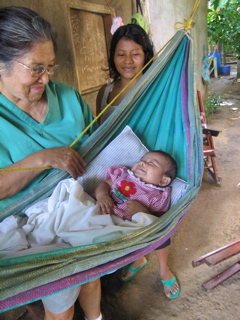
Why is it important to keep the clinic alive?
Friends tell me that the world is going to hell and I believe them.
George Bush again, the terrorist Negroponte becoming the head spy,
CAFTA looming, threatening more hunger, and landlessness, Iraq, U.S.
plans to bring "Democracy" to more countries rich in natural resources
and hope (Cuba, Venezuela). My childhood faith told me that if we do
good, and follow the rules of our faith, our lives and the world would
be okay. Our child's faith doesn't work anymore, does it? When this
evil plan to rule the world by violence and make the most amount of
money possible for the transnationals collapses, as it must, what will
we be left with? I believe that we will be left with models of work. Of
poor people who, with the help of their friends, have organized to meet
their most basic needs. I believe that the Maria Luisa Ortiz
Cooperative is such a model and, therefore, deserves your continuing
support. I'm giving it all that I've got with the years left to me.
Please enjoy an article in this newsletter written
by one of our visiting doctors. The group of progressive health
workers, Doctors for Global Health (DGH), sent volunteer gynecologist,
Dr. Linda Price, and anesthesiologist, Dr. Dan Price to inaugurate the
operating room by performing 25 surgical sterilizations and one
hysterectomy. Many of the women sterilized had more than 10 children
and were not candidates for other birth control methods. Also, please
learn from our visiting public health specialist, Sue Howe, about
Mulukuku’s new official status as a municipio. She also writes about
the pap smear study we conducted. We have been accepted to present our
findings with Dr. Janice Smith at the International Health Medical
Education Consortium in San Francisco at the beginning of the tour.
Dr. Saul Contreras, Director of APS (Atencion
Primary en Salud) continues the monthly three-day classes in early
recognition and attention of disease for 28 community health workers.
Each health worker now has a supply of 20 basic pharmaceuticals and
plant medicines with which to work. These workers join a growing
network throughout the country. APS addresses the lack of access to
health services that the majority of the rural poor suffer. Added to
this training the health workers received a two-day monthly course in
Human Rights Recognition and Intervention in Violence from the
University of the Atlantic Coast. Each health worker preformed a
diagnostic study of violence in her/his community.
Thank you, dear friends for being with us. Your
life, resources and good hearts are precious and absolutely necessary
for the survival of this endangered earth and all it's rocks, plants
and creatures including the women and children of Mulukuku.

|
ClinicTotals for
2004
Women 7,225
Men 881
Adolescents 1,390
Children 1,822
Dental 113
(62 children under age 5 received
2 prophylactic treatments)
Total 11,431
Protection of
Intra-familial Violence Program:
Consultations for women and children 17,144
Legal Office Actions:
Criminal Cases: 194
Civil Cases: 243
Women and children in Refuge 30
Pre Natal Care 1st visit 418
subsequent visits 693
Family Planning 1st visit 489
subsequent visits 1,014
Pap exams 1st visit 852
subsequent visits 725
Transfers for further health care 376
Cases of malaria 1,014
Women’s
Empowerment Network Announcements
Alice Nadelman, of Teaneck, New Jersey celebrated
her 60th birthday by encouraging her friends to donate to the clinic in
Mulukuku. What a tribute to the wisdom we gain over the years! Joan
Lewis did the same in Warsaw, Missouri. Thanks, gals!
Susan Studebaker donated her time to write an
$18,000 grant for the tuberculosis screening and treatment project, and
it was funded by the Potts Memorial Foundation in November! Those with
the stamina for grant writing are near and dear to our hearts.
Two memorial donations were received this month,
one from Sherrill Hogen who writes: “My great-nephew, Mason Ritton, age
4 years and 4 months died on November 17, 2004 of complications caused
by failure of his body to continue to support a transplant of his small
bowel and liver which he received at 17 months. He received the best
treatment money can buy plus the great love of his parents and baby
sister. I choose to remember him by donating to your clinic where your
great love will stretch these dollars to help many children who have
not been as lucky as Mason, in hopes they will survive. Thank you for
your dedication and courage. May the coming year bring you many
blessings.”
Linda Lucas also made a donation in honor of
Phyllis Stigall “who was a great champion of women’s rights and
empowerment. She died this week at age 87. We will miss her. Keep up
your good work.”
Thanks to all for sharing your love and kindness
through gifts of healing and dignity.
|
Extraordinary
Moments in Mulukuku
Our kids, Maya & Zoe, were excited to go to
Nicaragua (as they had been when we went to El Salvador for the prior 2
years for 3-4 weeks each time). They were now 6 & 8 years old --
veterans of sleeping on airplanes, standing in long lines at the
airports, and eating beans & rice 3 times a day.
My husband, Dan, and I are doctors who work at the
county hospital in Oakland California and have volunteered for Doctors
for Global Health (DGH) for 3 years. Our kids end up being a great
ice-breaker and most local people seem pleased that they are learning
Spanish.
We met Dorothy Granada at the DGH conference in
July 2003 and were caught by her charisma and vision. She made a plea
for doctors who perform women's surgeries and we responded. I am an ob/
gyn and Dan is an emergency medicine doctor. We could only go in
November of the following year but we did do it.
With the assistance of Dorothy, Grethel, and the
staff at the Women's Cooperative Clinic we performed 26 mini-lap tubal
sterilizations and one vaginal hysterectomy with bladder suspension
(that patient had 12 vaginal deliveries- ouch!). We used the BRAND NEW
operating room!
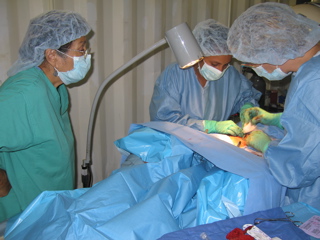
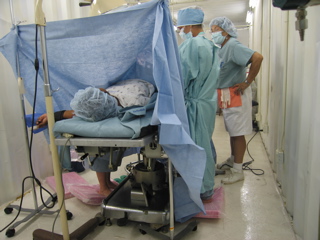
We used anesthetics which do not decrease a
patient's drive to breathe so we did not need to assist breathing on
any patient (midazolam, morphine, kefzol and ketamine for you medicos
out there).
Grethel and the clinic staff had hand-picked the
patients as being the poorest of the poor - those who could not really
feed the children they already had and for whom more children would
mean no chance ever of a better life. It was so nice to receive tearful
hugs of appreciation the next morning from the patients. Several
invited me to their houses for coffee (unfortunately that meant a 3
hour walk one way and I didn't have the time or the leg muscles that
they did).
On our first day of clinic, a baby came in and
died. The grief and unfairness of an easily treated condition was
heavy. The mom had done the right things but the lousy doctor down the
road that she saw only the afternoon before had not even examined the
baby. The baby had
died of malaria which in Mulukuku still responds well to medications.
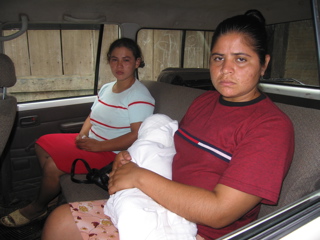
Later that week a 7 year old boy was carried for 4
hours into clinic by his 98 pound mother. He had been bitten by a
poisonous snake. The mother was concerned that the dry moss placed on
the snake bite by the herbalist was not working. There was only 1 vial
of the correct medication left at the clinic. The boy was in terrible
pain and fear but after a sedative and the vial of anti-venom he began
to recover ever-so-slowly. Two days later when both the boy and his mom
were smiling it brought tears to my eyes.
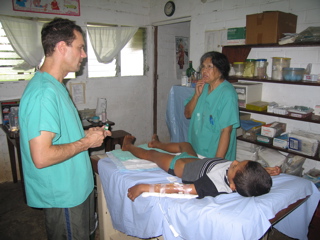
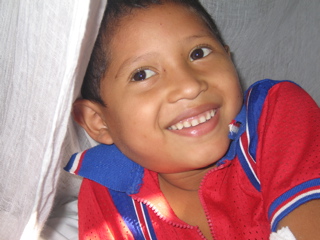
While we were performing surgeries, our kids
played on a farm with Grethel's grandkids. They got to go swimming,
drink coconut milk, go for horseback rides (and "ponyback" rides),
watch baby pigs drink from the mama pigs, chase chickens and check out
4 tiny bats that slept during the day high up on a wall. Our kids still
rave about a special kind of fruit drink called Calala juice. They got
to see a baby be born, see the boy with the snake bite get treated
& improve, and they saw the recovered patients being thankful.
On a Sunday afternoon we got a special escort of 5
friendly 7-10 year old boys to go to the river. It was warm, the rain
was warm and those boys really took care of our girls. While we were
all playing rock the canoe over, laugh & get back in, I realized
this lovely hand-carved wooden canoe was of course made of the local
wood -- mahagony! We were playing in a very valuable canoe!
To end with I'd just like to say that all those
unbelievable stories about Dorothy's love & courage are really
true. And, she is part of that community -- not a rich intermediary.
Like my kids said, "She is famous but doesn't even act like it!"
Linda Price MD, Berkeley
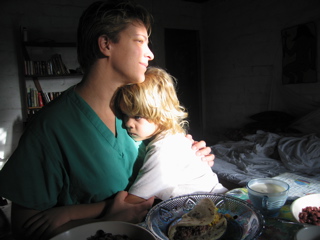
Volunteer surgeon Dr. Linda Price and her
daughter enjoy the morning light; this “quiet” scene is accompanied by
roosters!
|
“Hope and
Inspiration Alive and Well” Tour Is
over. Sorry!
Successful
Cervical Cancer Prevention in Mulukuku
By Susan Howe, MPH, San Diego
In 2003 the Maria Luisa Ortiz Clinic (MLO Clinic)
participated in a new cervical cancer-screening program involving the
coordinated efforts of three organizations. Nicaragua’s Ministry of
Health (MINSA) donated 2500 free vouchers for Pap screening and
follow-up treatment if needed through the Ginecobono program sponsored
by the Instituto CentroAmericano de la Salud (ICAS), a non-governmental
health research organization. The MLO Clinic coordinated outreach,
education, screening, tracking and follow-up of patients. ICAS
coordinated quality controlled cytology and diagnostic work-up with
LEEP treatment, if needed, and MINSA provided follow-up for those
patients requiring more extensive cancer treatment.
An evaluation of the first year of the program
(2003) showed that it was remarkably effective. Coming from over 79
remote communities throughout the North Atlantic Autonomous Region, a
total of 2132 women received Pap screening. 68% of the women were 25
and older and 32% under 25. The proportion of abnormal screens
requiring diagnostic follow up was 3.7 % for women over 25 and 0.04%
for women under 25, which is more than four times what would be typical
in the USA. The proportion of women with abnormal results who received
diagnostic work-up and treatment if needed was 91% for women over 25
and 100% for women under 25. The majority of the women were detected in
the early stages of disease when simple one-day outpatient treatment
can prevent invasive cancer. The ratio of pre-invasive disease to
invasive disease was almost two to one.
The success of this program demonstrates the
quality of service that the MLO Clinic is providing. The MLO Clinic was
able to reach the women of the RAAN at highest risk for cancer, with
quality cytology screening and high rates of diagnostic follow-up,
showing that cervical cancer screening can succeed in remote,
low-resource settings when coordinated efforts are made to remove
barriers and ensure quality.
The 2500 vouchers have now been used, and the MLO
Clinic is looking for funding or other methods to continue their
successful program. A voucher for Pap screening through the Ginecobono
program costs $12 (USA Dollars) but this fee covers the cost of
diagnostic work-up and treatment if the woman should need it.
Clinic Director Dorothy Granada, Public Health
Specialist Susan Howe of San Diego, and Dr. Janice Smith of Galveston
will present these findings at the International Health Medical
Education Consortium (IHMEC) conference in San Francisco on March 31.
Mulukuku Wins the
Right to its Own Municipality
Mulukuku and the surrounding villages in the
western section of Nicaragua’s North Atlantic Autonomous Region (RAAN)
scored a victory in October when they won the right to organize and
represent themselves as their own district (municpality or municipio).
Both the clinic and the legal office run by the
Maria Luisa Ortiz Cooperative serve the poor, underserved and neglected
region on the west edge of the RAAN. Located between Rio Blanco to the
west and Siuna to the Northeast, these communities have been caught in
a political no-man’s land, unable to organize their local services or
elect delegates to represent their local interests. This victory will
help them move forward.
An important factor in winning this victory was
the development of a network of community representatives
(Brigadistas). Throughout 2004 these Brigadistas came into Mulukuku
each month for a week of medical and legal training so that they could
diagnose and treat the most common illnesses, help settle disputes and
resolve family issues in their communities, where there are no doctors
or lawyers.
In July these Brigadists came to Managua as a
large group and pleaded their case for re-districting before a
committee of the National Assembly. Demonstrating their training, they
were well organized, spoke eloquently and presented a strong case for
re-districting. There have been other large, well attended meetings
held throughout the Mulukuku region as well.
This is an important victory and will pave the way
for more organization and better services for the area. It will also
enable the clinic and the legal office to better coordinate and
follow-up on needs in these outlying communities. - Susan Howe, MPH,
San Diego
|